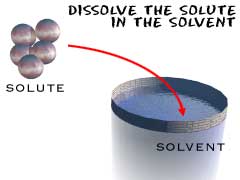
Solute is a substance which dissolves in a liquid.
Solvent is a liquid which dissolves other substances.
Solution is when a solute dissolves in a solvent.It is a homogeneous mixture in which one or more substances are dissolved in another substance.
Remember, solute + solvent = solution!!
Question : 30 cm ( cube ) + 50 cm (cube ) equals to 80 cm ( cube )?
False!!!!!!!
That is not true as the solute particles are smaller then the solvent particles, therefore the solute particles will occupy the space between the solvent.
When a solute dissolves in a solvent, the solute particles surround each solvent particles. The particles then mix uniformly to form the solution. They do not combine chemically.
Types of solution
solid-liquid: sugar solution, salt solution
gas-liquid:hydrochloric acid, soft drinks
solid-solid:brass, bronze
liquid-liquid:vinegar, beer, wine
gas-gas:air,natural gas
Suspension
-suspension is a mixture of small insoluable particles in a liquid gas.
-when a solid does not dissolve in a liquid, a suspension is formed.
-the solid is said to be insoluable
Ex of suspension: calamine lotion, medicine, sea water
Question: Why does suspension formed?
Ans: In a suspension, the solvent particles are smaller, whereas the solute particles are bigger, therefore they don't formed a solution.
Question:Why does suspension appears cloudy or chalky?
Ans: It's because some particles are so light that they do not sink but remain floating.
As the solid particles are bigger than the liquid particles and the holes in the filter paper, suspension can therefore be separated by filtration.
A saturated solution contains the maximum amount of solute that can dissolved in a fixed amount of solvent at a particular temperature.
Solubility of solutes
-the maximum amount of solute that can dissolved in 100g of solvent at a given temperature.
-higher the solubility, the more soluble the substance.
Strength of a solution=concentration
The concentration of a solution=the amount of solute in 1000cm ( cube ) of solution.
A concentrated solution can be made more diluted by adding more solvent.
Ex: to dilute a cup of orange juice, we can add more water
Factors affecting the extent of dissolving
-Nature of a solvent
The solubility of a solute is different in different solvents.
-Nature of solute
Different solutes have different solubility in a solvent.
-Temperature
The higher the temperature of solvent, the higher the solubility of solute.
Rate of dissolving is affected by
-Temperature
-Rate of stirring
-Size of solute particles
Reflections
After learning all these, I had more understanding of liquids and solids particles and they can even help me in my daily life.
Foe example, when I'm about to be late for school, I would prepared a cup of milo with high temperature of the water and also stir as fast as possible, so that the solute particles will dissolved faster and I will not be late.
I could also used this concept when making a cup of orange juice or even Ribena. I learnt how to make the juice more diluted or concentrated according to the guest.


No comments:
Post a Comment